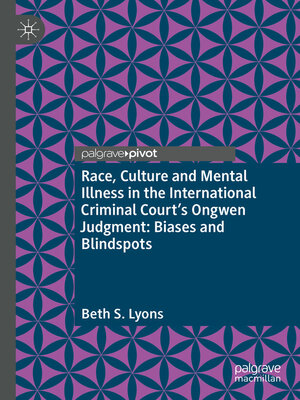Race, Culture and Mental Illness in the International Criminal Court's Ongwen Judgment
ebook ∣ Biases and Blindspots
By Beth S. Lyons

Sign up to save your library
With an OverDrive account, you can save your favorite libraries for at-a-glance information about availability. Find out more about OverDrive accounts.
Find this title in Libby, the library reading app by OverDrive.



Search for a digital library with this title
Title found at these libraries:
| Library Name | Distance |
|---|---|
| Loading... |
Dominic Ongwen was abducted in 1987 when he was 8 or 9 years old by the Lord's Resistance Army ('LRA') in Northern Uganda and trafficked as a child soldier; he made multiple unsuccessful attempts to escape, and finally succeeded in late 2014. He turned himself into the International Criminal Court in 2015 and was prosecuted. Mr. Ongwen's defence was that he was not responsible for the crimes of the LRA, based on his mental illnesses and duress, stemming from his abduction and subsequent coercion and indoctrination under Joseph Kony within the LRA. In February 2021, the ICC's Trial Chamber IX convicted Dominic Ongwen of 61 charges and two modes of liability and he was sentenced to 25 years incarceration.
This work critiques the judicial racial and cultural biases and blindspots in the Ongwen Judgment rendered by the ICC, as related to the affirmative defences of mental disease or defect and duress and to sentencing, from the perspective of the author who served as a defence counsel in the case.







